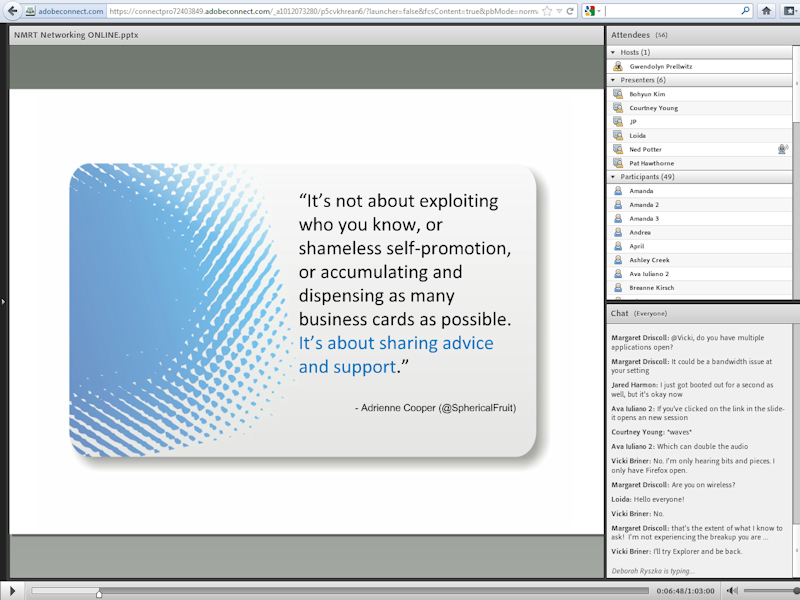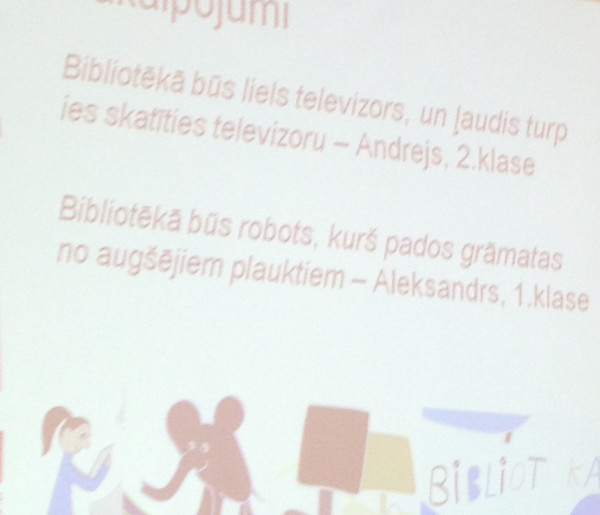I believe that as a new professional in the information industry, you're better off with a plan of where you want to be, and specifically HOW you want to get there. Some people (who I respect very much) have advocated a 'relax and see what happens' approach, pointing out the need to be able to try new things you'd never have thought of, and be taken off in new directions. I agree with this, but I still think this:
The profession is SO competitive now, if you can come up with a plan of how you'll move through it then it's worth doing so, even in the knowledge that it's perfectly okay not to stick to it if something interesting comes up.
So how do you go about this? Well first of all you need to know where you'd actually like to end up. (And by 'end up' I don't necessarily mean the job you'll retire in - just the one you're aiming for in the medium term.) There are various ways of getting a feel for this:
- Talk to people in those roles (seriously do this - it's MUCH more effective than anything else I can think of. If you'd like to chat about what being a Subject Librarian involves and the skills it requires I'm very happy to do so)
- Try and get some work-shadowing in those roles, or an actual job in a more junior version of the same role
- Read about how people got where they are today via the many excellent stories on the Library Routes Project
- Keyword search the Library Day in the Life wiki for the kind of job titles you're interested in, and see how people in these roles actually spend their days
- (I'm probably missing something useful so please leave a comment with more suggestions if you have them...) .
Once you've formulated an idea as to where you want to get to (and keep in mind this may evolve or change completely as you go along, which is fine), you can start to plan how to get there. Relating to this there are two important things which I've mentioned on here before, and in talks to New Professionals.
Firstly don't think of Librarianship as having a career-ladder, think of it is as having a career-climbing wall. Ladders go straight up and have evenly spaced rungs; climbing walls require a certain amount of traversing or diagonal movement, and a certain amount of inching forward followed by ambitions stretches, to get to the top of them. The example I always give is if you want to be a Customer Services manager for your library - the natural place to start is in Customer Services itself as a lending assistant (or whatever - the terminology is interchangable here but hopefully you know what I mean) but there's often a 3 pay-grade gap between asssistant and manager, with no obvious jobs in between. It's very, very rare for anyone to jump three grades in one go - so you need to go diagonally upwards so you're high enough up the grade structure to get a high-graded role, whilst trying to retain the relevant experience necessary to become the Customer Services manager. This improvisation and flexibility is not very ladder-like, and much more akin to a climbing wall.
The second thing I always advocate is to find the job you really want (Head of Special Collections, Subject Librarian, Children's Librarian, Law Librarian or whatever) and when you see it advertised at the kind of place you want to work, download the job spec and save it in a folder even when you have absolutely zero chance of being able to apply any time soon. Look at the person specification and make sure you shape your professional experiences to hit every single one of the essential and desirable skills over the coming years (either through jobs or involvement with professional bodies or writing papers or giving presentations or all four of these) so that you're in a position to nail the application in the future. Luck is when preparedness meets opportunity as they say - every time a great job comes up, you have a chance to try and manipulate your future luck in your favour...
The Organisational Chart
So to the point of this post, the Organisatinal Chart (known also as Organisational Structure, Staffing Framework and, apparently, an 'organogram'). The Organisational Chart shows how the hierachy of any given organisation works - who is at the head, who is responsible to and for whom, how the teams fit together, and who manages what. It's quite hard to get hold of ones for organisations you don't work for, so I'd recommend finding your own library's (it's probably in the intranet somewhere...) and saving a copy into the same folder as your ideal job spec. Obviously libraries in different sectors have very different charts, so if you're aiming to work in the academic sector then a public sector chart may not be of much use to you.
I can't find a single Creative Commons example online (for obvious reasons) so here's a link to a publicly available chart for a big library. Obviously the point of this chart is to detail the positions and how it all fits together, but for the excited new professional it's a chart to literally plan an upwards trajectory with a highlighter pen (if you print it out - I wouldn't recommend using one on your monitor). Ask yourself, which of the higher jobs than mine can I get next? Does it lead to the job I really want (or the job before the job I really want)? Could I stand doing X for a year if it helped me get to Y the year after, or am I better off doing Z for two years and getting more relevant experience outside of the workplace at the same time?
I think it's particularly important to look at where the tree structure stops or hits a dead-end. Look at the role you're in now - is the only position directly above that your boss? Is your boss likely to leave any time soon? If not, you need to make proper plans for progression or you'll be doing the same thing you're doing now in 5 years time. Is there a path which opens up lots of possibilities for you, as opposed to the 'dead-mans shoes' syndrome of waiting for one or two people to retire or leave? Is the division you're in one with many holds on the climbing wall or just one or two (both of which someone else already has a firm grip on)?
I'm not advocating naked ambition - ambition for ambition's sake is something I'm not a fan of at all. But you DO want to be fulfilled, and ultimately you will want to earn a decent wage rather than get stuck on an okay one forever. If your current path hits the buffers in one job's time, think about the fact that you're going to be in this for 20, 30, 40 years so even if it's worthy and fulfilling now, it may not be stimulating when you're still doing it in 2020. Because as much as the rhetoric around library jobs is often about how 'none of us are in this for the money' and 'I just want a job I'm happy doing' the fact is there are lot of frustrated librarians who have just got mired in a certain part of their library and can't see an obvious path forward. So I really think it's worth being aware of what the future possibilites are, so you can start planning how you'll meet the challenges and achieve whatever it is that will make you happy.
It is, in my view, much better to be happy than successful. Being the 'best you can be' is only worth it if it makes you happy - I see a lot of people putting pressure on themselves, hitting great heights, but not being overly content. But forward planning never hurts, so even if you're not aiming for Head Librarian (I know I'm not - I'm going to completely ignore all my own advice and stagnate in my current job forever, although I did a lot of the above into practice to get to this position that I actually like in the first place) then knowing what you ARE aiming for will help you stay fulfilled.
If you're interested, there's a whole page of essential advice for new professionals elsewhere on this website, put together from the quotes of loads of librarians who have been there and done that...
Good luck!
- thewikiman






